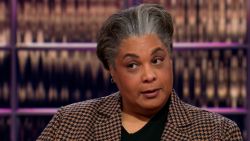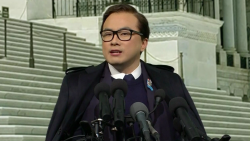The following contains spoilers about the Nov. 25 midseason finale of “The Walking Dead.”
Three weeks after saying goodbye to Andrew Lincoln, “The Walking Dead” closed out its fall run by apparently saying goodbye to another significant character – a departure, at this point, the AMC series can ill afford.
“Apparently,” it’s worth noting, because the series has continued to play fast and loose with deaths, including its latest fake-out, which saw Lincoln’s Rick Grimes character seem to die, only to be miraculously saved, in order to revive him in a planned series of movies.
What has become crystal clear, since that much-ballyhooed exit, is that AMC’s one-time hit is running on fumes – relying on a small core of established characters while trying to establish a handful of new ones who, thus far, have provided little incentive to tune in.
In the past, “The Walking Dead” stayed fresh – and unpredictable – by killing off characters with some regularity, a reminder that this lawless world was one where death represented a part of life.
The recent spate of departures, however – including Carl, Rick, Lauren Cohan’s Maggie and, in the latest episode, Jesus (Tom Payne) falling victim to new threat the Whisperers – has drained the show of considerable appeal, without filling the void. Throw in Lennie James’ Morgan, who relocated to spinoff “Fear the Walking Dead,” and the series has become a shambling facsimile of its best days.
The latest episode sought to address some of those concerns, ostensibly by bringing Jeffrey Dean Morgan’s Negan back into the storyline in a more significant way – having spent the first half of the season locked up – and unveiling the secret of the Whisperers, with a human revealed to have been masquerading as a zombie and thus controlling the herd.
Still, asking the latest threat to reinvigorate the show after at least three seasons of disappointing results – amid declining, if stabilizing, ratings – seems like a lot to ask. And while the series still has a sturdy core in the likes of Daryl (Norman Reedus), Michonne (Danai Gurira) and Carol (Melissa McBride), the time-jump that closed Rick’s final episode has made even their stories less interesting, surrounded, as they are, by characters who at this point don’t represent much more than possible zombie food.
Granted, the naysaying about “The Walking Dead” has become its own kind of slow-rolling virus, in part because of the perceived passion among what’s left of its cult audience. The Hollywood Reporter’s Daniel Fienberg, for example, recently concluded that despite marginal improvement this season, it’s essentially too little, too late.
Nine years is a good long run in TV, and about the only thing likely to jump-start interest in the series at this point would be the promise of an ending.
So far, though, AMC’s strategy hasn’t been to acknowledge that “The Walking Dead” might be ambling toward the finish line, but rather to keep trying to double down on it, hoping Lincoln can serve as the linchpin to expand the show’s “universe” into new frontiers.
That might make sense from a business perspective. Creatively speaking, though, the longer “The Walking Dead” keeps operating on what amounts to life support, the higher the chance that the series, like its latest death, will go out less with a shout than a whisper.





















